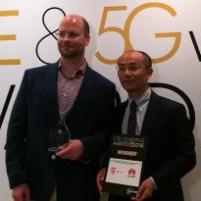  At the 2016 5G World Awards, Huawei and Deutsche Telekom jointly won the award for Most Notable Partnership between an Operator and Solutions Provider for 5G Trials and Development. It is based on their continuous 5G innovations and close cooperation for contributions to the communications industry.
At the 2016 Mobile World Congress (MWC) held in Barcelona, Deutsche Telekom and Huawei, together with 5G: haus partners showcased the world's first 5G E2E network slicing system. This technology aims to efficiently create network slicing on demand in each given application scenario, with high flexibility and efficiency for the upcoming diversified 5G applications. Deutsche Telekom and Huawei also showcased millimeter wave multiuser multiple-input and multiple-output (MIMO) technology, which reached a transmission rate of 70 Gbps on the 73 GHz millimeter wave band and significantly increased spectrum efficiency.
The world's first showcase of 5G E2E network slicing was created in the 5G: haus framework with strong contribution from the Huawei-Deutsche Telekom Innovation Center based in Bonn, Germany. In the 5G: haus, Deutsche Telekom is engaging with leading research and industry partners to evaluate potential 5G technology enablers. 5G: haus leverages DT’s European footprint, with trials and evaluations taking place at many different host locations. DT and Huawei’s cooperation within 5G: haus was announced in March 2015 – and builds on successful ongoing LTE innovation cooperation on the way to 5G. In February 2016, Deutsche Telekom and Huawei demonstrated greater than 500 Megabits per second peak speeds over-the-air on DT’s live LTE network in Berlin, Germany, based on LTE-A 4x4MIMO with carrier aggregation.
Since the emergence of the communications industry, telecom operators and equipment providers have always been close partners, dedicated to constructing an industry ecosystem that fosters innovation – and changing the ways in which people communicate. Huawei has founded 26 competence centers throughout the world and attracted an increasing number of excellent scientists worldwide to commit to making breakthroughs in fundamental innovations. To promote the sustainable development of the wireless communications industry, Huawei has established 8 mobile innovation centers with leading global operators to focus on joint fundamental innovations, application innovations, and engineering innovations.
In the new and exciting 5G era, operators will extend their service scope from predominant individual services to multiple vertical industries. As a result, the mobile communications industry ecosystem will be expanded accordingly. During this process, operators have laid a solid foundation of human resources, funds, technologies, sales networks, and after-sale service systems, and even have maintained advantages over top enterprises in vertical industries. These advantages allow operators to implement future revenue growth by enabling increasing connections and accessing more vertical industries.
In addition, equipment providers make a larger innovation investment compared to other technology companies. Huawei has over 80,000 R&D personnel and has invested over 10% of its sales revenues into R&D expenses. The increased R&D investment, even at the cost of reduced profits, indicates the continuous endeavor made by equipment providers to make innovations. Operators should also increase investments rather than reduce costs and ignore innovations for future investments.
5G will also create more valuable new services. A comprehensive adoption of cloud technologies for network equipment will allow operators to accelerate the provision of new services, implement agile service development, and conduct open cooperation and continuous innovation. Huawei introduced CloudRAN by cloudifying radio access networks, which was an unprecedented fundamental innovation in the wireless industry.
As an important element of 5G architecture, Huawei CloudRAN can be used in various wireless network environments and application scenarios to help operators maintain technological advantages and accelerate the emergence of new services to cope with uncertainties in the future wireless network evolution. CloudRAN will enable wireless networks to become a key booster for innovation and the core infrastructure contributing to economic and social development. Huawei will continue to work with top global operators and invest in CloudRAN innovation research to maximize network value and improve user experience. |